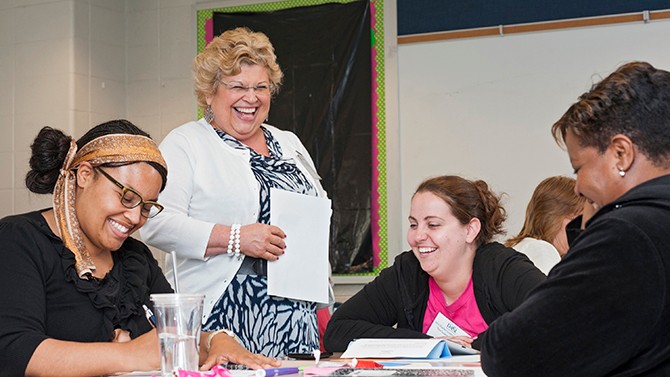School of Education
Education and professional development centers merge

This fall, the University of Delaware created the Center for Educational Leadership, Teaching and Learning (CELTL), uniting the professionals from the Delaware Academy of School Leadership (DASL), UD’s Professional Development Center for Educators (PDCE) in the College of Education and Human Development, and the Southern Delaware Professional Development Center (SDPDC) in the College of Arts and Sciences.
With this merger, the Center for Educational Leadership, Teaching and Learning now has a unified mission to facilitate ongoing professional learning opportunities for educators that maximize student growth through the use of research-based practices.
“Our vision for CELTL is to become an eminent professional learning organization for educators in Delaware, the region, and across the nation,” said Carol Vukelich, dean of UD’s College of Education and Human Development. “Our model of providing customized professional learning and ongoing support while measuring our impact through research positions us to reach a broader constituency of educators. This simply wasn’t possible when we were operating as three separate centers.”
“These three centers have served the Delaware K-12 education community for more than a decade. Merging into one cohesive unit allows us to more effectively leverage our collective expertise to support our colleagues in K-12 schools,” said Jackie Wilson, director of CELTL.
CELTL provides professional support to classroom teachers on the core content areas of English language arts, mathematics, science and social studies, as well as services in supporting teacher capacity for building effective classroom culture and supporting English language learners.
“This merger benefits our school partners across the state of Delaware,” said Tracy Hudson, associate, who served as the coordinator for SDPDC. “We are no longer divided by artificial boundaries of ‘upstate’ and ‘downstate’; now we can work as a unified team to serve all schools in the state.”
The center’s content area professionals have been helping teachers and administrators implement instruction and assessment that is aligned with Common Core English language arts and mathematics, and the Next Generation Science Standards.
The center:
• Engages schools and districts in educational partnerships that allow K-12 teachers and CELTL professionals to work collaborative to solve problems of practice;
• Has federal and state grant-funded projects that provide teachers with professional learning opportunities beyond what is offered by their districts; and
• Regularly engages in collaborative educational partnerships with faculty across the university, including those in the colleges of Engineering and Arts and Sciences, to offer research-based professional learning programs to teachers in specific disciplines.
Educational leaders, including school principals, curriculum directors, and superintendents, also benefit from CELTL’s services, which include:
• Leadership coaching for current school leaders and district office personnel is intended to provide support in managing schools and expanding the professional capacity of its leaders.
• The Step-Up Program is a development program for assistant principals to prepare them to be principals.
• The Executive Leadership Academy is designed to address issues that pertain to superintendents and their district executive leadership teams.
• The ASPIRE program provides hands-on exposure to teacher leaders who endeavor to learn more about school leadership.
Ashley Giska, assistant superintendent in the Laurel School District in Delaware, described CELTL as having “a unique approach to comprehensive school support that would be hard to find from any national vendor. Their content area expertise and vast experience in Delaware K-12 leadership gives them instant creditability in our schools and teacher buy-in comes easily through their supportive coaching partnerships.”
The Laurel School District has experienced significant growth in student achievement and realized powerful leadership potential in administrators, she added.
“I directly attribute to the work we have partnered on with CELTL. Something incredible happens when we put the best minds in Delaware in our schools with the greatest need, and the result is truly tremendous,” Giska said.
Wilson said she plans to expand CELTL’s reach regionally and nationally over the next five years, by providing timely, contextualized support to educational partners. “We have a highly qualified team of professionals who have extensive experience in classroom teaching, school leadership, and educational research,” said Wilson. “Our team is poised to reach more schools with greater depth and impact.”
Educators interested in partnering with CELTL, or looking for more information about CELTL’s services, should contact Emily Poag, CELTL associate, at emilyp@udel.edu or 302-831-1279.
Article by Amy Trauth-Nare
Photo by Evan Krape



